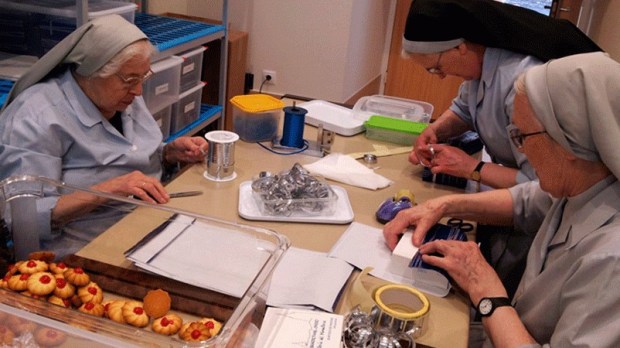When a group of Benedictine nuns in Oviedo, northern Spain, were unable to sell the sweets they make at Easter because of the pandemic restrictions, a group of lay Catholics came together to buy everything up. Turning to the WhatsApp app, a local resident mobilized people to buy the surplus treats at the door of the San Pelayo convent (while respecting the requirements of social distancing).
The message (reported in the Spanish news outlet ABC) posted to the group said:
“Good afternoon. First of all, forgive me for this message; I know that this is not the place, but you understand. It’s about the Benedictine community known as ‘Las Pelayas.’ One of their activities to sustain themselves is confectionery. They haven’t been able to sell anything, and they have a lot of cookies that they would have to get rid of. They called me to see to whom they could donate the cookies. But before they do this, if any of you want to gift cookies to someone, or to yourself, you can buy them at the convent from 9 a.m. to 2 p.m. and from 4 p.m. to 6:30 p.m. You can spread the word to your friends. It would be very helpful for the sisters.”
A wave of solidarity passed through family, friends, and acquaintances — along with messages from other people who were aware of the nuns’ plight. Residents of the city began showing up on the first day after word got out. When night arrived, there were no more cookies left to be sold, which caused the opposite “problem” — now the nuns had to meet the excess demand!
The convent, located in Asturias, has existed for over a thousand years: It was founded in 994, with the arrival of the relics of the martyr St. Pelagius. Besides making cookies, the nuns of the community also live from the binding and restoration of books.
According to reporter Juan Fernández-Miranda of ABC, the nuns of San Pelayo are “loved and respected” in the city. The reporter’s article concludes eloquently,
“This is a true story, in which the protagonists act with spontaneous generosity, social networks are used to unite people, and neighbors in a city are thankful for the work of some nuns who are part of the community from time immemorial. This is solidarity in the times of the virus.”

Read more:
Need prayers? Phone this convent

Read more:
Contemplative monasteries and convents join “prayer storm” during coronavirus pandemic

